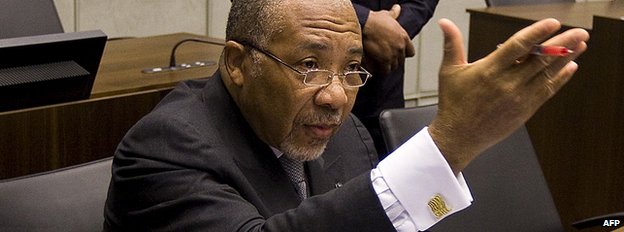A UN-backed war crimes tribunal has convicted former Liberian leader Charles Taylor of aiding and abetting rebels who committed atrocities in neighbouring diamond-rich Sierra Leone and sentenced him to 50 years in prison. The BBC's Mark Doyle looks back at his career.
Liberia's former President Charles Taylor is a frustrated showman.
There is nothing this naturally confident man liked better than to strut the African stage playing the flamboyant statesman.
When he was a rebel in the early 1990s, controlling most of Liberia apart from the capital, he turned up at a West African regional conference in Burkina Faso in full military combat gear.
His equally well-protected bodyguards jogged alongside his car from the airport to the centre of the capital, Ouagadougou, in a show of strength and loyalty.
When, as president in 1999, he faced accusations from the United Nations that he was a gun runner and a diamond smuggler, he addressed a mass prayer meeting clothed from head to foot in angelic white.
The showman, who at the time was also a lay preacher in the Baptist tradition, prostrated himself on the ground and prayed forgiveness before his Lord – although he also denied the charges.
Media savvy
And even when he could not be seen by his public, the showman found a stage.
Throughout the 1990s Taylor conducted a series of dramatic telephone interviews with the BBC's Focus on Africa programme.
The first, from the then-relatively unknown warlord, announced his invasion of Liberia.
In one famous exchange with former BBC Focus on Africa editor Robin White a few years later, Mr White suggested that some people thought him little better than a murderer.
Taylor bellowed with a flourish to the effect that "Jesus Christ was accused of being a murderer in his time".
Charles Taylor was born in 1948 to a family of Americo-Liberians, the elite group that grew out of the freed slaves who founded the country in the 19th Century.
For what are suspected to be political reasons – broadening his appeal to the indigenous African majority – Mr Taylor added the African name "Ghankay" in later years, becoming Charles Ghankay Taylor.
Like many Americo-Liberians he studied in the United States.
He returned home shortly after Master Sergeant Samuel Doe mounted Liberia's first successful coup d'etat in 1980.
Taylor landed a plum job in Doe's regime running the General Services Agency, a position that meant controlling much of Liberia's budget.
Rogues' gallery
He later fell out with Doe, who accused him of embezzling almost $1m (£626,000), and fled back to the US.
Taylor denied the charges, but ended up in the Plymouth County House of Correction in Massachusetts, detained under a Liberian extradition warrant.
Some reports say he managed to escape the prison by sawing through the bars; others that there was some collusion in his departure from Americans who wanted him to play the role he then proceeded to carve out for himself – overthrowing the corrupt, violent and generally disastrous regime of Samuel Doe.
Taylor's rebellion succeeded partly because of Doe's incompetence. But it was also the fruit of Taylor's building of sometimes surprising alliances.
Over the years, his friends included the late Colonel Muammar Gaddafi of Libya, the conservative former ruler of Ivory Coast Felix Houphouet-Boigny, the current President of Burkina Faso, Blaise Compaore, and a rogues' gallery of businessmen, local and foreign, prepared to flout UN disapproval to make money in Liberia.
After winning power militarily, Taylor won elections in 1997.
Although the polls were probably the most democratic the country had seen at the time, Taylor's critics say he bullied and bought the electorate.
Some of his youthful supporters were heard to chant during the campaign: "He killed my ma, he killed my pa, I'll vote for him."
When asked about it in a BBC interview, he said: "They mean it, you know, and they love me."
Tennis
Taylor has been married three times and has several children.
In 2005, after he had left power, his then wife Jewel was elected to Liberia's senate.
While president, he used to enjoy table tennis and lawn tennis, which he played behind the high walls of his Monrovia residence.
He was detained by the UN-backed Special Court for Sierra Leone in 2006 after a period of enforced exile in Nigeria.
His arrest was appropriately dramatic for the showman that he still was – it involved his initial apparent "disappearance" from his residence in Nigeria, a chase across the country with Taylor in a disguised diplomatic car, and his eventual arrest, allegedly with huge sacks of cash, on the Nigeria-Cameroon border.
His first arrival at the courtroom of the Special Court in Freetown was equally dramatic – he turned up there after his exploits in Nigeria in a UN helicopter surrounded by armed UN guards.
He looked dishevelled and unshaven and donned a UN-issue bullet-proof jacket.
But by the time he first appeared in court for the initial hearings in Freetown he was in a sombre European business suit with a classic red tie.
The showman had returned, but in more reflective mood.
BBC

